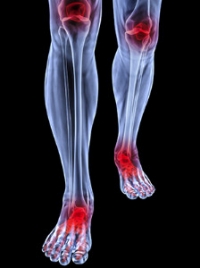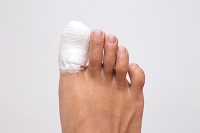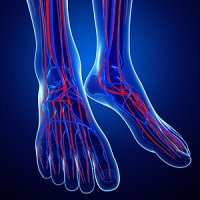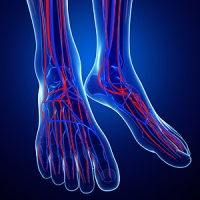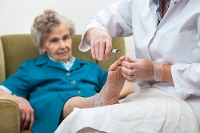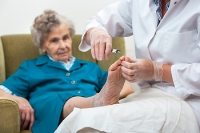
Blog (809)
Foot Conditions That May Occur as a Result of Rheumatoid Arthritis
If you are afflicted with rheumatoid arthritis, you may develop foot conditions that may be associated with this ailment. There are several symptoms that may be connected with this condition, including discomfort and soreness in the feet, instability involving the joints of the toes, the front of the foot, and swelling. Fluid filled sacs, which is referred to as bursae, may develop as a result of the inflammation that occurs. This is due to extreme rubbing, especially on the sole of the foot. Corns, calluses and blisters may be side effects of this painful condition, in addition to circulatory problems concerning the feet. If you feel you are in the process of developing rheumatoid arthritis, it’s strongly suggested to speak with a podiatrist who can offer proper treatment options for this ailment.
Because RA affects more than just your joints, including the joints in your feet and ankles, it is important to seek early diagnosis from your podiatrist if you feel like the pain in your feet might be caused by RA. For more information, contact Dr. Kenneth Donovan of Advanced Care Foot and Ankle. Our doctor will assist you with all of your podiatric concerns.
What Is Rheumatoid Arthritis?
Rheumatoid Arthritis (RA) is an autoimmune disorder in which the body’s own immune system attacks the membranes surrounding the joints. Inflammation of the lining and eventually the destruction of the joint’s cartilage and bone occur, causing severe pain and immobility.
Rheumatoid Arthritis of the Feet
Although RA usually attacks multiple bones and joints throughout the entire body, almost 90 percent of cases result in pain in the foot or ankle area.
Symptoms
- Swelling and pain in the feet
- Stiffness in the feet
- Pain on the ball or sole of feet
- Joint shift and deformation
Diagnosis
Quick diagnosis of RA in the feet is important so that the podiatrist can treat the area effectively. Your doctor will ask you about your medical history, occupation, and lifestyle to determine the origin of the condition. Rheumatoid Factor tests help to determine if someone is affected by the disease.
If you have any questions please feel free to contact one of our offices located in Warren, Livingston, and Toms River, NJ . We offer the newest diagnostic and treatment technologies for all your foot and ankle needs.
Foot Conditions That May Occur as a Result of Rheumatoid Arthritis
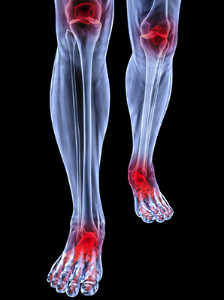 If you are afflicted with rheumatoid arthritis, you may develop foot conditions that may be associated with this ailment. There are several symptoms that may be connected with this condition, including discomfort and soreness in the feet, instability involving the joints of the toes, the front of the foot, and swelling. Fluid filled sacs, which is referred to as bursae, may develop as a result of the inflammation that occurs. This is due to extreme rubbing, especially on the sole of the foot. Corns, calluses and blisters may be side effects of this painful condition, in addition to circulatory problems concerning the feet. If you feel you are in the process of developing rheumatoid arthritis, it’s strongly suggested to speak with a podiatrist who can offer proper treatment options for this ailment.
If you are afflicted with rheumatoid arthritis, you may develop foot conditions that may be associated with this ailment. There are several symptoms that may be connected with this condition, including discomfort and soreness in the feet, instability involving the joints of the toes, the front of the foot, and swelling. Fluid filled sacs, which is referred to as bursae, may develop as a result of the inflammation that occurs. This is due to extreme rubbing, especially on the sole of the foot. Corns, calluses and blisters may be side effects of this painful condition, in addition to circulatory problems concerning the feet. If you feel you are in the process of developing rheumatoid arthritis, it’s strongly suggested to speak with a podiatrist who can offer proper treatment options for this ailment.
Because RA affects more than just your joints, including the joints in your feet and ankles, it is important to seek early diagnosis from your podiatrist if you feel like the pain in your feet might be caused by RA. For more information, contact Dr. Kenneth Donovan of Advanced Care Foot and Ankle. Our doctor will assist you with all of your podiatric concerns.
What Is Rheumatoid Arthritis?
Rheumatoid Arthritis (RA) is an autoimmune disorder in which the body’s own immune system attacks the membranes surrounding the joints. Inflammation of the lining and eventually the destruction of the joint’s cartilage and bone occur, causing severe pain and immobility.
Rheumatoid Arthritis of the Feet
Although RA usually attacks multiple bones and joints throughout the entire body, almost 90 percent of cases result in pain in the foot or ankle area.
Symptoms
- Swelling and pain in the feet
- Stiffness in the feet
- Pain on the ball or sole of feet
- Joint shift and deformation
Diagnosis
Quick diagnosis of RA in the feet is important so that the podiatrist can treat the area effectively. Your doctor will ask you about your medical history, occupation, and lifestyle to determine the origin of the condition. Rheumatoid Factor tests help to determine if someone is affected by the disease.
If you have any questions please feel free to contact one of our offices located in Warren, Livingston, and Toms River, NJ . We offer the newest diagnostic and treatment technologies for all your foot and ankle needs.
Do Your Child’s Feet Hurt?
Do Your Child's Feet Hurt?
What are the Symptoms of a Broken Toe?
There are several ways to incur a broken toe. Repetitive motions can cause a hairline fracture in the toe, in addition to dropping a heavy object on it. Some people may experience stubbing a toe, which is the result of hitting it against a hard surface. This may produce severe discomfort and pain, and a broken toe may be an unfortunate result. There are noticeable symptoms associated with a broken toe, including swelling, bruising and difficulty in walking. The toe may appear deformed, and this may depend upon the severity of the fracture. It’s important to have a proper diagnose performed, and this is often accomplished by having an X-Ray taken. Treatment of a broken toe may include taping it to the toe next to it, which is often referred to as buddy taping. It’s important to speak with a podiatrist as quickly as possible to learn about additional treatment options concerning a broken toe.
A broken toe can be very painful and lead to complications if not properly fixed. If you have any concerns about your feet, contact Dr. Kenneth Donovan from Advanced Care Foot and Ankle. Our doctor will treat your foot and ankle needs.
What to Know About a Broken Toe
Although most people try to avoid foot trauma such as banging, stubbing, or dropping heavy objects on their feet, the unfortunate fact is that it is a common occurrence. Given the fact that toes are positioned in front of the feet, they typically sustain the brunt of such trauma. When trauma occurs to a toe, the result can be a painful break (fracture).
Symptoms of a Broken Toe
- Throbbing pain
- Swelling
- Bruising on the skin and toenail
- The inability to move the toe
- Toe appears crooked or disfigured
- Tingling or numbness in the toe
Generally, it is best to stay off of the injured toe with the affected foot elevated.
Severe toe fractures may be treated with a splint, cast, and in some cases, minor surgery. Due to its position and the pressure it endures with daily activity, future complications can occur if the big toe is not properly treated.
If you have any questions please feel free to contact one of our offices located in Warren, Livingston, and Toms River, NJ. We offer the newest diagnostic and treatment technologies for all your foot and ankle needs.
Symptoms of Poor Circulation in the Feet
A condition known as poor circulation may often be a result of other health issues the body may have. These may include obesity, certain heart conditions, and diabetes. There are symptoms that are indicative of poor circulation in the feet, including experiencing a tingling sensation, total numbness, moderate to severe pain, or muscle cramps. There is a condition that is referred to as peripheral artery disease, or PAD, which can lead to poor circulation. The arteries and blood vessels become smaller, and this may restrict blood flow to the feet. The patient may experience nerve and tissue damage as a result of this condition not being treated. People who are obese may develop poor circulation and daily activities including walking and sitting that puts excess pressure on the feet, may possibly contribute to this ailment. If you are experiencing symptoms of poor circulation in the feet, please consult with a podiatrist as quickly as possible.
While poor circulation itself isn’t a condition; it is a symptom of another underlying health condition you may have. If you have any concerns with poor circulation in your feet contact Dr. Kenneth Donovan of Advanced Care Foot and Ankle. Our doctor will treat your foot and ankle needs.
Poor Circulation in the Feet
Peripheral artery disease (PAD) can potentially lead to poor circulation in the lower extremities. PAD is a condition that causes the blood vessels and arteries to narrow. In a linked condition called atherosclerosis, the arteries stiffen up due to a buildup of plaque in the arteries and blood vessels. These two conditions can cause a decrease in the amount of blood that flows to your extremities, therefore resulting in pain.
Symptoms
Some of the most common symptoms of poor circulation are:
- Numbness
- Tingling
- Throbbing or stinging pain in limbs
- Pain
- Muscle Cramps
Treatment for poor circulation often depends on the underlying condition that causes it. Methods for treatment may include insulin for diabetes, special exercise programs, surgery for varicose veins, or compression socks for swollen legs.
As always, see a podiatrist as he or she will assist in finding a regimen that suits you. A podiatrist can also prescribe you any needed medication.
If you have any questions, please feel free to contact one of our offices located in Warren, Livingston, and Toms River, NJ. We offer the newest diagnostic and treatment technologies for all your foot care needs.
Read more about Causes Symptoms and Treatment for Poor Circulation in the Feet
Symptoms of Poor Circulation in the Feet
 A condition known as poor circulation may often be a result of other health issues the body may have. These may include obesity, certain heart conditions, and diabetes. There are symptoms that are indicative of poor circulation in the feet, including experiencing a tingling sensation, total numbness, moderate to severe pain, or muscle cramps. There is a condition that is referred to as peripheral artery disease, or PAD, which can lead to poor circulation. The arteries and blood vessels become smaller, and this may restrict blood flow to the feet. The patient may experience nerve and tissue damage as a result of this condition not being treated. People who are obese may develop poor circulation and daily activities including walking and sitting that puts excess pressure on the feet, may possibly contribute to this ailment. If you are experiencing symptoms of poor circulation in the feet, please consult with a podiatrist as quickly as possible.
A condition known as poor circulation may often be a result of other health issues the body may have. These may include obesity, certain heart conditions, and diabetes. There are symptoms that are indicative of poor circulation in the feet, including experiencing a tingling sensation, total numbness, moderate to severe pain, or muscle cramps. There is a condition that is referred to as peripheral artery disease, or PAD, which can lead to poor circulation. The arteries and blood vessels become smaller, and this may restrict blood flow to the feet. The patient may experience nerve and tissue damage as a result of this condition not being treated. People who are obese may develop poor circulation and daily activities including walking and sitting that puts excess pressure on the feet, may possibly contribute to this ailment. If you are experiencing symptoms of poor circulation in the feet, please consult with a podiatrist as quickly as possible.
While poor circulation itself isn’t a condition; it is a symptom of another underlying health condition you may have. If you have any concerns with poor circulation in your feet contact Dr. Kenneth Donovan of Advanced Care Foot and Ankle. Our doctor will treat your foot and ankle needs.
Poor Circulation in the Feet
Peripheral artery disease (PAD) can potentially lead to poor circulation in the lower extremities. PAD is a condition that causes the blood vessels and arteries to narrow. In a linked condition called atherosclerosis, the arteries stiffen up due to a buildup of plaque in the arteries and blood vessels. These two conditions can cause a decrease in the amount of blood that flows to your extremities, therefore resulting in pain.
Symptoms
Some of the most common symptoms of poor circulation are:
- Numbness
- Tingling
- Throbbing or stinging pain in limbs
- Pain
- Muscle Cramps
Treatment for poor circulation often depends on the underlying condition that causes it. Methods for treatment may include insulin for diabetes, special exercise programs, surgery for varicose veins, or compression socks for swollen legs.
As always, see a podiatrist as he or she will assist in finding a regimen that suits you. A podiatrist can also prescribe you any needed medication.
If you have any questions, please feel free to contact one of our offices located in Warren, Livingston, and Toms River, NJ . We offer the newest diagnostic and treatment technologies for all your foot care needs.
How Elderly People Can Check Their Feet
Many people who are elderly may develop uncomfortable foot conditions as they age. Research has shown there may be many reasons for this to occur. This may include a loss of cushioning in the skin and the nails losing moisture, which may become brittle. If you are contending with poor circulation, any sores that may be present may prove difficult to heal. People of all ages should check their feet regularly to look for cuts, blisters, or ingrown toenails. This is especially true of the older population who may experience difficulty in seeing clearly or bending down. Some patients find it helpful to use a mirror to see the bottom of their feet, or may ask a family member or friend for assistance. It’s important to have your feet measured frequently to ensure the correct size shoe is worn, in addition to wearing socks that fit snugly but are not too tight. If you find conditions such as ingrown toenails, bunions, or corns have developed, it’s suggested to speak with a podiatrist as quickly as possible for correct treatment.
Proper foot care is something many older adults forget to consider. If you have any concerns about your feet and ankles, contact Dr. Kenneth Donovan from Advanced Care Foot and Ankle. Our doctor can provide the care you need to keep you pain-free and on your feet.
The Elderly and Their Feet
As we age we start to notice many changes in our body, but the elder population may not notice them right away. Medical conditions may prevent the elderly to take notice of their foot health right away. Poor vision is a lead contributor to not taking action for the elderly.
Common Conditions
- Neuropathy – can reduce feeling in the feet and can hide many life-threatening medical conditions.
- Reduced flexibility – prevents the ability of proper toenail trimming, and foot cleaning. If left untreated, it may lead to further medical issues.
- Foot sores – amongst the older population can be serious before they are discovered. Some of the problematic conditions they may face are:
- Gouging toenails affecting nearby toe
- Shoes that don’t fit properly
- Pressure sores
- Loss of circulation in legs & feet
- Edema & swelling of feet and ankles
Susceptible Infections
Diabetes and poor circulation can cause general loss of sensitivity over the years, turning a simple cut into a serious issue.
If you have any questions please feel free to contact one of our offices located in Warren, Livingston, and Toms River, NJ. We offer the newest diagnostic and treatment technologies for all your foot and ankle needs.
How Elderly People Can Check Their Feet
 Many people who are elderly may develop uncomfortable foot conditions as they age. Research has shown there may be many reasons for this to occur. This may include a loss of cushioning in the skin and the nails losing moisture, which may become brittle. If you are contending with poor circulation, any sores that may be present may prove difficult to heal. People of all ages should check their feet regularly to look for cuts, blisters, or ingrown toenails. This is especially true of the older population who may experience difficulty in seeing clearly or bending down. Some patients find it helpful to use a mirror to see the bottom of their feet, or may ask a family member or friend for assistance. It’s important to have your feet measured frequently to ensure the correct size shoe is worn, in addition to wearing socks that fit snugly but are not too tight. If you find conditions such as ingrown toenails, bunions, or corns have developed, it’s suggested to speak with a podiatrist as quickly as possible for correct treatment.
Many people who are elderly may develop uncomfortable foot conditions as they age. Research has shown there may be many reasons for this to occur. This may include a loss of cushioning in the skin and the nails losing moisture, which may become brittle. If you are contending with poor circulation, any sores that may be present may prove difficult to heal. People of all ages should check their feet regularly to look for cuts, blisters, or ingrown toenails. This is especially true of the older population who may experience difficulty in seeing clearly or bending down. Some patients find it helpful to use a mirror to see the bottom of their feet, or may ask a family member or friend for assistance. It’s important to have your feet measured frequently to ensure the correct size shoe is worn, in addition to wearing socks that fit snugly but are not too tight. If you find conditions such as ingrown toenails, bunions, or corns have developed, it’s suggested to speak with a podiatrist as quickly as possible for correct treatment.
Proper foot care is something many older adults forget to consider. If you have any concerns about your feet and ankles, contact Dr. Kenneth Donovan from Advanced Care Foot and Ankle. Our doctor can provide the care you need to keep you pain-free and on your feet.
The Elderly and Their Feet
As we age we start to notice many changes in our body, but the elder population may not notice them right away. Medical conditions may prevent the elderly to take notice of their foot health right away. Poor vision is a lead contributor to not taking action for the elderly.
Common Conditions
- Neuropathy – can reduce feeling in the feet and can hide many life-threatening medical conditions.
- Reduced flexibility – prevents the ability of proper toenail trimming, and foot cleaning. If left untreated, it may lead to further medical issues.
- Foot sores – amongst the older population can be serious before they are discovered. Some of the problematic conditions they may face are:
- Gouging toenails affecting nearby toe
- Shoes that don’t fit properly
- Pressure sores
- Loss of circulation in legs & feet
- Edema & swelling of feet and ankles
Susceptible Infections
Diabetes and poor circulation can cause general loss of sensitivity over the years, turning a simple cut into a serious issue.
If you have any questions please feel free to contact one of our offices located in Warren, Livingston, and Toms River, NJ . We offer the newest diagnostic and treatment technologies for all your foot and ankle needs.

